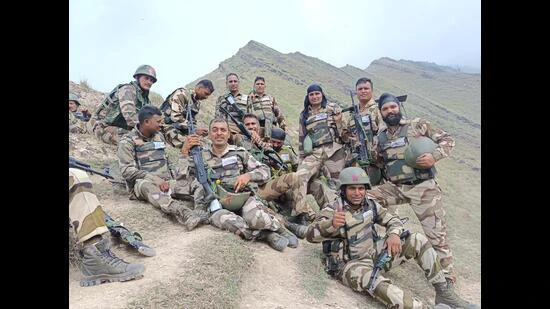New Delhi The Indian army is training Central Industrial Security Force (CISF) commandos, who are part of Quick Reaction Teams (QRTs) posted outside vital installations along the India-Pak border in Jammu & Kashmir, in counterterror operations and drone incursions, officials aware of the matter said, and called it a significant development in the wake of the Pahalgam terror attack.
“CISF Parliament Security Team Undergoes Specialised Army Commando Training. In a major stride towards bolstering the security of the Temple of Democracy, select #CISF personnel are undergoing an intensive #ARMY Special Commando Training program in the Kashmir valley. The training focuses on advanced combat tactics, urban warfare, counter-terror drills and anti-sabotage operations – sharpening the operational edge of CISF personnel. This initiative highlights CISF’s unwavering commitment to excellence, inter-agency synergy and its evolving role in safeguarding national institutions amid emerging security challenges,” the CISF posted on X on Thursday.
An officer aware of the matter, who asked not to be named, said that more than 100 CISF commandos have already completed an intensive training at the army camp over the last one month. The army teams are training the QRT personnel in dealing with armed “drone incursions” and “insider threats”.
“Currently, around 50 personnel, who are posted at the QRTs of the Parliament are undergoing training with the army in the Valley. Due to the high alert across the vital installation along the border after the Pahalgam attack in April, the Union home ministry had approached the Indian army for intensive training of the QRT commandos. Only those personnel, above 35, who have already passed the battle efficiency test aligned with the National Security Guard(NSG) standard are eligible for this training with different army formations on the ground. Dealing with enemy drones is a major part of this ongoing exercise,” the officer said.
During India Operation Sindoor on May 10, Pakistan launched drones and loitering munitions against Indian military installations and civilian infrastructure but failed to inflict any damage as the threats were thwarted by India’s robust multilayered air defence network. At the Jammu airport, such drones were shot down by NSG personnel.
The CISF, which guards 369 vital installations across the country, including the Parliament, manages the security of at least 11 installations in Jammu and Kashmir such as the Kargil Hydroelectric project in Bandipora, Kishanganga dam site in Gurez and hydro power projects in Uri 1 and Uri 2. Some of these installations are right across the border making it the most sensitive and vulnerable to attacks from Pakistan. While the force is on static security duty, the aim of the training is to make at least one component in such vulnerable areas “battle ready.”
“The army is currently training the QRT commandos in five specific modules – jungle warfare, night operations, endurance building drills and close-combat tactics . The training is happening on the ground in different units across the Valley. The goal is to ensure our personnel are professionally trained by battle hardened experts to thwart armed infiltration, sabotage and terror attacks in both urban and rural habitats,” the officer added.
